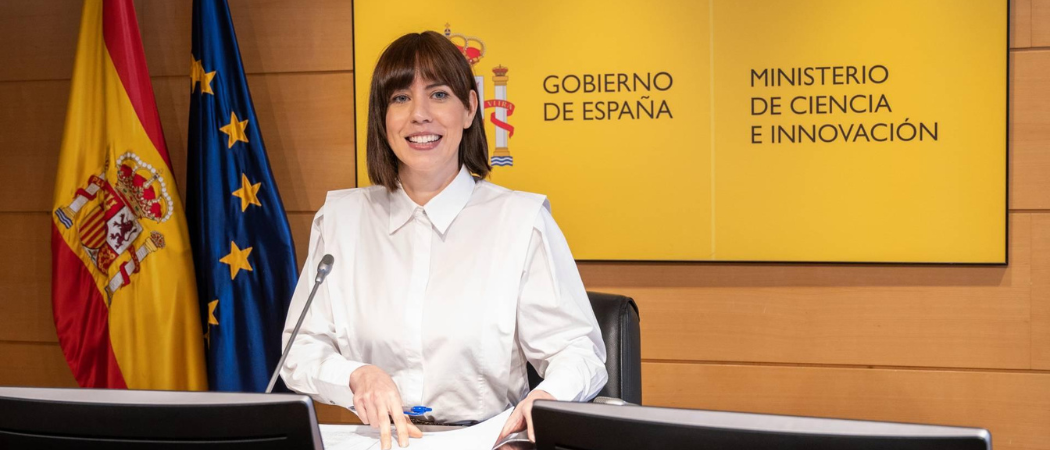EU research ministers are to focus on embedding science in key policy areas and on research cooperation in the Mediterranean and Latin America during Spain’s six-month stint leading the Council

Spanish minister of Science and Innovation, Diana Morant. Photo: Ministry of Science and Innovation, Government of Spain
Europe, closer: with that statement of intent Spain has kicked off its six-month stint leading the EU. For science this means a focus on expanding the reach of research and innovation into policy areas related to strategic autonomy, digitisation and green policies, and at the same time advancing cooperation in these spheres with North Africa and Latin America.
Research minister Diana Morant told Science|Business the presidency hopes to get the EU closer to leading a “fair and human research and innovation system,” that works for people and helps tackle the economic, environmental and social challenges facing the bloc.
“In line with the motto of our presidency 'Europe, closer', we want to promote science and innovation that are close to us and that contributes to improving the lives of European citizens and the health of our democracies,” Morant said in a written interview.
In practice, this means building partnerships and making sure R&I has a role to play in policymaking – the Spanish hope to advance scientific cooperation with Latin America and the southern Mediterranean area, as well as adopting a joint position on the role of science in public policy.
With no major legislative files on the table, it’ll be a presidency focused on setting a strategic direction for the years to come. “This period, without major legislative demands, is an opportunity that allows our presidency to focus the debate on future strategic elements,” said Morant.
It all kicks off with an informal meeting of research ministers in Santander on 27-28 July, where debates on science diplomacy and the politics of the next Horizon Europe strategic plan for 2025 to 2027 are on the agenda.
Science for policy
The main item on the research ministers’ agenda is a set of Council conclusions on the role of R&I in policymaking. They’ll consolidate a common European position on three issues: the role of science in public policies; the role of regional and local innovation ecosystems in strengthening territorial cohesion; and the impact of the EU’s recovery plan on R&I.
The goal is “to give political guidance on how science and innovation should effectively contribute to policymaking,” said Morant.
Spain, she says, has positioned itself as a leader in prioritising R&I policy in the last few years. The country has carried out sweeping reforms of its R&I system and allocates the second largest percentage of EU recovery money to science and innovation out of all EU member states.
“We want to exchange best practices in the field of science and innovation policy, so that we can continue to improve the national system and at the same time contribute to the improvement of the European system,” said Morant.
Discussions on the draft are set to take place over the next couple of months, with the adoption foreseen in a formal ministers’ meeting on 8 December.
International hopes
Spain‘s presidency will have a strong focus on remaining open to the world while preserving strategic autonomy, and R&I cooperation is part of the puzzle.
Looking to Africa, Spain will seek to extend the EU Partnership for Research and Innovation in the Mediterranean Area (PRIMA) to 2027, to continue the project that connects EU with the southern Mediterranean to tackle local challenges, such as effective water management and the development of a sustainable agri-food value chain.
It’s a strategic move, and the hope is the project can carry on to the next EU research programme beyond 2027. “It is increasingly clear that Europe's destiny is linked to that of Africa and its social progress,” said Morant.
Collaboration with Latin American countries will also be highlighted with a reference in the Council conclusions on science for policy.
On the cards
A few items on the agenda are yet to be decided. The member states will discuss the five Horizon Europe Missions once the Commission presents its review of the first two and a half years of the new type of programmes that promised to seed change on the ground.
The Commission says the review will be out next week. If the review proposes a major overhaul of the Mission approach or proposes to add a new Mission, the presidency will lead the member states in adopting a joint position on the changes in the form of Council conclusions. If the Commission says the Missions are fine as they are, the presidency won’t take action.
Another likely item on the agenda is a debate on research careers. This, again, depends on the Commission putting forward a proposal for a Council recommendation on the issue, which insiders say could come as early as July.
Spain is a frontrunner when it comes to tackling precarious research careers. Its revamped science bill promises research staff more stability and better employment conditions.
“Dignifying the scientific professions has been and continues to be our absolute priority,” said Morant. “We hope to be able to put this issue on the table at the initiative of the Commission during our presidency.”
If the Commission doesn’t put forward a draft, the issue of research careers won’t be sidelined. With multiple events on open science policy coming up, careers and how they are assessed will be part of the discussion at the Open Science Fair International Congress in Madrid and the Marie Sklowodoska Curie Actions Conference in Toledo.
“We hope to discuss these new ways of measuring research performance beyond quantitative indicators, through new qualitative and social impact criteria and new incentives for open publication,” said Morant.
Elsewhere on the agenda
Space. The Spanish hope to get ministers responsible for space to adopt Council conclusions on space traffic management as part of EU efforts to increase security in outer space as well as prepare conclusions on the Space Strategy for Security and Defence (SSSD). Morant says the goal is to help Europe lead globally in the responsible use of space.
Education: There’s a lot going on in education, with Spain set to complete the mid-term review of the European Education Area 2025, hold the second conference on ending sexual harassment in academia, in Bilbao in October, and propose two sets of Council recommendations on digital skills and education.
European Health Data Space: Outside the realm of research ministers but in the near vicinity of science policy, the Spanish will lead the negotiations on the legislation for the European Health Data Space (EHDS), the Critical Raw Materials Act and the Net Zero Industry Act.
STEP: The Spanish will lead the negotiations on the Strategic Technologies for Europe Platform (STEP) the Commission proposed last month. The proposal includes an extra €2.6 billion for Horizon Europe’s start-up fund, the European Innovation Council (EIC) Accelerator, which provides grant and equity funding to cash-strapped start-ups.
SET-Plan: The next conference on the European Strategic Energy Technology Plan (SET-Plan), a ten-step plan to boost innovation and production along the entire low-carbon energy chain from research to market, will be held in Barcelona mid-November.
Research infrastructures: No EU Council presidency goes without spotlighting research infrastructures. Spain will hold a conference dedicated to research infrastructures in Tenerife on 25 and 26 September. On the agenda are discussions on sustainability, the use of EU’s cohesion and regional funds for the construction and operation of research infrastructures and the role of big and small science labs in tackling global challenges.





 A unique international forum for public research organisations and companies to connect their external engagement with strategic interests around their R&D system.
A unique international forum for public research organisations and companies to connect their external engagement with strategic interests around their R&D system.